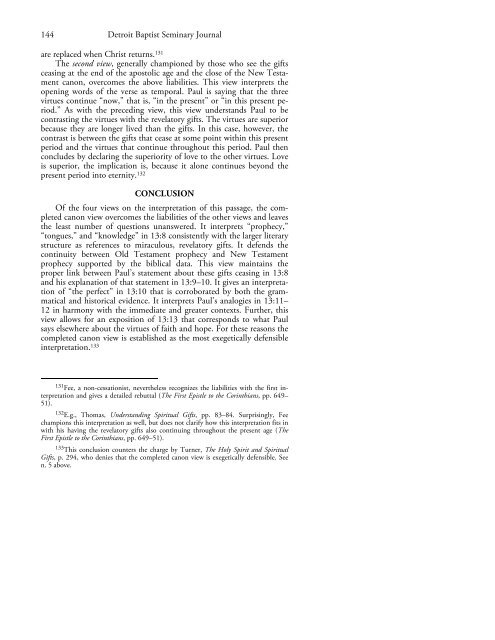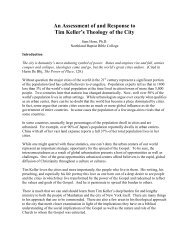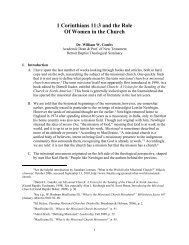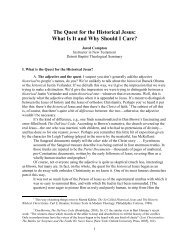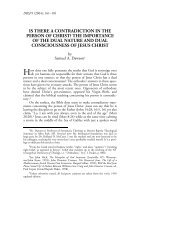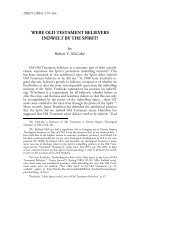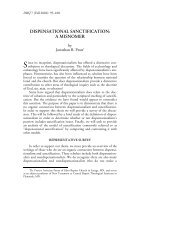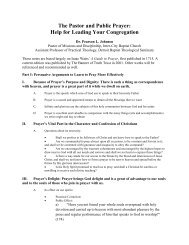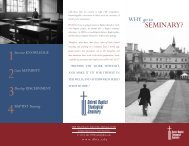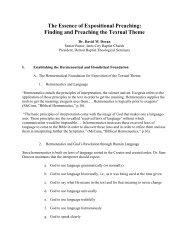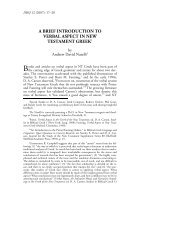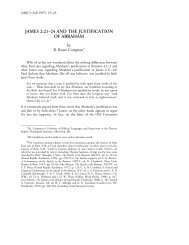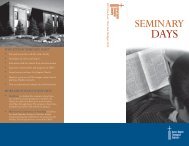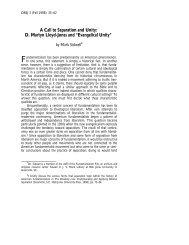1 Corinthians 13:8–13 and the Cessation of Miraculous Gifts
1 Corinthians 13:8–13 and the Cessation of Miraculous Gifts
1 Corinthians 13:8–13 and the Cessation of Miraculous Gifts
Create successful ePaper yourself
Turn your PDF publications into a flip-book with our unique Google optimized e-Paper software.
144 Detroit Baptist Seminary Journalare replaced when Christ returns. <strong>13</strong>1The second view, generally championed by those who see <strong>the</strong> giftsceasing at <strong>the</strong> end <strong>of</strong> <strong>the</strong> apostolic age <strong>and</strong> <strong>the</strong> close <strong>of</strong> <strong>the</strong> New Testamentcanon, overcomes <strong>the</strong> above liabilities. This view interprets <strong>the</strong>opening words <strong>of</strong> <strong>the</strong> verse as temporal. Paul is saying that <strong>the</strong> threevirtues continue “now,” that is, “in <strong>the</strong> present” or “in this present period.”As with <strong>the</strong> preceding view, this view underst<strong>and</strong>s Paul to becontrasting <strong>the</strong> virtues with <strong>the</strong> revelatory gifts. The virtues are superiorbecause <strong>the</strong>y are longer lived than <strong>the</strong> gifts. In this case, however, <strong>the</strong>contrast is between <strong>the</strong> gifts that cease at some point within this presentperiod <strong>and</strong> <strong>the</strong> virtues that continue throughout this period. Paul <strong>the</strong>nconcludes by declaring <strong>the</strong> superiority <strong>of</strong> love to <strong>the</strong> o<strong>the</strong>r virtues. Loveis superior, <strong>the</strong> implication is, because it alone continues beyond <strong>the</strong>present period into eternity. <strong>13</strong>2CONCLUSIONOf <strong>the</strong> four views on <strong>the</strong> interpretation <strong>of</strong> this passage, <strong>the</strong> completedcanon view overcomes <strong>the</strong> liabilities <strong>of</strong> <strong>the</strong> o<strong>the</strong>r views <strong>and</strong> leaves<strong>the</strong> least number <strong>of</strong> questions unanswered. It interprets “prophecy,”“tongues,” <strong>and</strong> “knowledge” in <strong>13</strong>:8 consistently with <strong>the</strong> larger literarystructure as references to miraculous, revelatory gifts. It defends <strong>the</strong>continuity between Old Testament prophecy <strong>and</strong> New Testamentprophecy supported by <strong>the</strong> biblical data. This view maintains <strong>the</strong>proper link between Paul’s statement about <strong>the</strong>se gifts ceasing in <strong>13</strong>:8<strong>and</strong> his explanation <strong>of</strong> that statement in <strong>13</strong>:9–10. It gives an interpretation<strong>of</strong> “<strong>the</strong> perfect” in <strong>13</strong>:10 that is corroborated by both <strong>the</strong> grammatical<strong>and</strong> historical evidence. It interprets Paul’s analogies in <strong>13</strong>:11–12 in harmony with <strong>the</strong> immediate <strong>and</strong> greater contexts. Fur<strong>the</strong>r, thisview allows for an exposition <strong>of</strong> <strong>13</strong>:<strong>13</strong> that corresponds to what Paulsays elsewhere about <strong>the</strong> virtues <strong>of</strong> faith <strong>and</strong> hope. For <strong>the</strong>se reasons <strong>the</strong>completed canon view is established as <strong>the</strong> most exegetically defensibleinterpretation. <strong>13</strong>3<strong>13</strong>1 Fee, a non-cessationist, never<strong>the</strong>less recognizes <strong>the</strong> liabilities with <strong>the</strong> first interpretation<strong>and</strong> gives a detailed rebuttal (The First Epistle to <strong>the</strong> <strong>Corinthians</strong>, pp. 649–51).<strong>13</strong>2 E.g., Thomas, Underst<strong>and</strong>ing Spiritual <strong>Gifts</strong>, pp. 83–84. Surprisingly, Feechampions this interpretation as well, but does not clarify how this interpretation fits inwith his having <strong>the</strong> revelatory gifts also continuing throughout <strong>the</strong> present age (TheFirst Epistle to <strong>the</strong> <strong>Corinthians</strong>, pp. 649–51).<strong>13</strong>3 This conclusion counters <strong>the</strong> charge by Turner, The Holy Spirit <strong>and</strong> Spiritual<strong>Gifts</strong>, p. 294, who denies that <strong>the</strong> completed canon view is exegetically defensible. Seen. 5 above.


